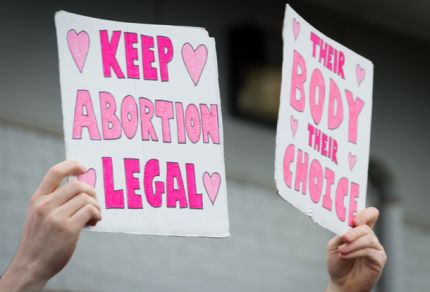The following article by NARAL Pro-Choice North Carolina Executive Director Tara Romano originally appeared in NC Policy Watch.
On Wednesday of this week, the U.S. Supreme Court will hear its first abortion rights case since the Trump administration and a sharply divided U.S. Senate combined to empanel the high court’s first solid anti-abortion majority in the modern era. The confirmation of the hyper-partisan and ultraconservative Brett Kavanaugh to the Court in October 2018 appears to have provided the fifth vote anti-abortion interests have been looking for – one that could potentially overturn 1973’s Roe v. Wade decision and roll back the reproductive freedom that has been guaranteed to at least two generations of Americans.
The case that will be heard, June Medical Services v. Russo, comes out of Louisiana and covers well-worn territory – namely, can states arbitrarily restrict abortion access based on regulations that have little, if any, basis in medical science and best practices? In this case, the court is reviewing Louisiana’s 2014 law requiring abortion providers to have admitting privileges at local hospitals. It’s a requirement that has proven difficult for abortion providers to meet, due both to hospital politics and the fact that abortion is an overwhelmingly safe procedure for patients.
You may recall that a 2016 Supreme Court case – Whole Women’s Health v Hellerstadt – reviewed the very same law out of Texas. In a 5-3 decision, that law was found unconstitutional and overly burdensome, and states were reminded they had to base regulations of any medical procedure, including abortion, in science and fact, not political ideology.
So what is the difference between the 2016 and 2020 admitting privileges cases? In a word, nothing – other than the membership of the Supreme Court. And while the anti-abortion talking points may have changed, the intent – to re-criminalize abortion – is the same.
Indeed, North Carolinians will remember that when anti-abortion lawmakers passed similar medically unnecessary abortion restrictions in 2013, they claimed that their goal was not to create obstacles to abortion access, but merely to “improve patient safety.” Since 2016, however, the message of anti-abortion protestors outside of clinics, at city council meetings, and in state houses debating criminal punishment for patients has tilted more towards “abortion is murder” rather than “women need to be safe when obtaining abortion.”
With June Medical Services v. Russo, however, we are back to anti-abortion talking points that claim restrictions are really all about “patient safety” – this despite the American College of Obstetrics and Gynecologists stating that admitting privileges do nothing to enhance patient safety and can actually harm patients by creating obstacles to safe abortion care. Louisiana lawmakers, in an effort to dismiss this inconvenient medical fact, have also thrown in a challenge to the longstanding precedent that physicians can bring challenges to anti-abortion laws on behalf of their patients, claiming that the interests of physicians and patients are in direct conflict with each other.
This duplicitous messaging both ignores the reality of the lengthy and costly process involved in challenging any unjust laws, and also indulges in longstanding and unfair stereotypes of abortion providers. Just like in any profession where there may be bad actors, there have been abortion providers who have taken advantage of patients for their own benefit, particularly in the time before 1973 when desperate patients turned to underground networks when seeking abortion.
In 2020, however, the vast majority of physicians providing abortion care do it in spite of the obstacles such a practice may introduce into their lives, including professional stigmatization, harassment and violence. Abortion providers often see the difficult situations their patients face and step into the role because they are deeply moved to help their patients, not exploit them.

Decisions around reproductive health and family planning can be confusing, messy and heavy, but for all the conflicting feelings people may have about abortion, the vast majority of Americans believe it’s not their place to tell someone else what decision to make; and they certainly don’t think the government should be making that call.
The decision in June Medical Services v Russo should come out in June, and we are deeply concerned that, while it may not directly overturn the standard set in Roe v. Wade, it will continue the process of deeply eroding access to safe and legal abortion. It’s well documented that Roe has fallen short on its promise of ensuring equitable access to abortion for all who need it, but that doesn’t mean it’s not an important legal standard. Roe should be the floor for safe and legal abortion access, not the ceiling, and what we are facing now is the Supreme Court potentially removing even that basic standard of access, and putting the lives and health of people seeking abortion further into jeopardy.
Further criminalizing abortion is not going to end abortion; it will just make it illegal and unsafe for those who seek it out. And whatever the Supreme Court decides, the majority of us will continue to provide support, love and compassion for the nearly one-in-four American women who make this decision, trusting that they know what is best for themselves and their lives at that moment.
And we’ll keep fighting for freedom for all to make these decisions for themselves.
